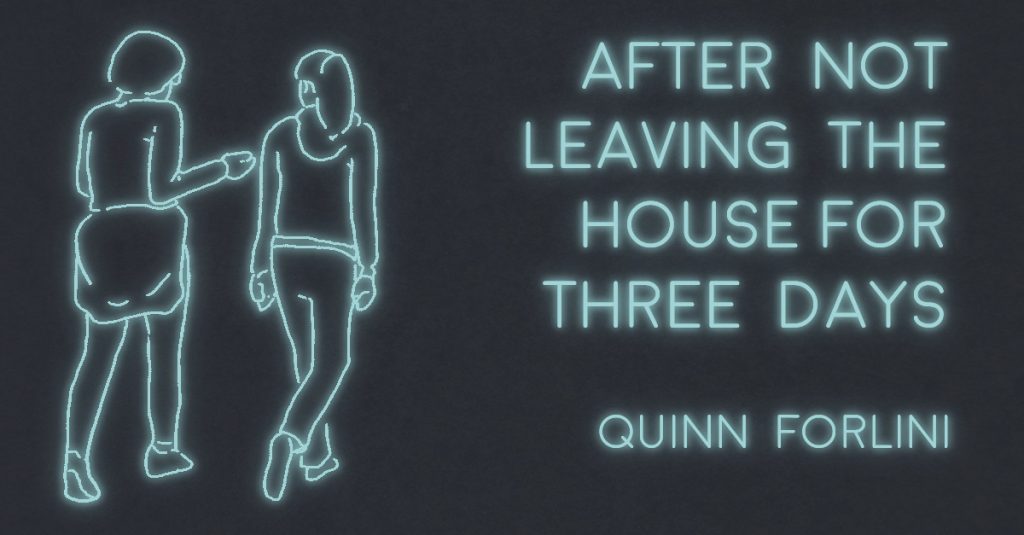Anna’s mother convinces her to go for a walk. The weather’s getting warmer. Anna feels like she’s been living inside a tunnel, or an artery.
She’s thirteen. Last week she dyed her hair purple from a box at the drugstore and it’s ugly. She pulls her hair into a ponytail, feeling the roughness as it passes through her fingers from the cheap dye. Her mother tried to warn her, and that made her want it more.
Her mother reminds her for the seventh time that it’s a bit chilly out, so at the last second, Anna grabs her dad’s black hoodie from the hook in the front hall where it’s sat untouched for months and lets it bury her body. She’s glad she’s so lost in it, no hint of shape, just darkness. She digs her hands into the front pocket so they disappear.
She follows her mother down the driveway, shuffling her feet and looking at the ground. Her mom talks and she barely listens. She looks up at her mother’s dark sunglasses that are too big for her face and the sweatshirt she has tied around her waist. She examines her mother’s body as it moves against the crumpled knot of sleeves clustered at her belly. The empty arms swing against her thighs like an awkward gift bow. Her mother is slightly overweight, enough that it makes Anna wonder: Will that happen to me? She looks back at the ground, imagining her bleak future as her body becomes filled like a grocery bag a clerk is doing a bad job packing. Her mother talks on and on, her left hand gesturing for emphasis as if the words weren’t enough. Not that Anna’s listening. Not that she has any idea what her mom is saying.
She doesn’t know how long they’re going to walk. One strip of sidewalk becomes another, and she wishes she’d asked before they left, made it part of the bargain. She doesn’t want to ask now because she doesn’t want to sound like she’s complaining. She has an intense desire to complain all the time lately, and she’s fighting it as much as she can. That’s why she’s here, sullenly dragging herself along on this walk, even though all she wants to do is get lost in reality TV for hours and not talk to anyone. But she hates this desire almost as much as she desires it.
Anna knows there was a time when this walk would’ve felt easier, when talking to her mother would’ve been all she wanted. Now she speaks one word at a time only when she has to. She hates how hard everything has become, even things that used to seem simple, like putting on socks.
Her mother mentions that maybe they should start heading back because of the sky. Anna tunes back into her mother’s words, their familiar pattern of concern. She feels annoyance spring in her at how easily her mother becomes deterred, even though Anna didn’t want to go on this walk in the first place. She looks up at the sky and notices how quickly it’s shifting from blue to overcast. She finds herself pulled into it like a movie. She wishes she knew what her mother had been talking about all this time, but she can’t ask, or she’d have to admit she was ignoring her. Was it something about work? A friend? Her therapist? The sky feels like it’s folding in on itself. The grayness makes it feel closer. Anna’s warm, and it feels novel and miraculous that she can do something about this. She pulls the hoodie over her head, releases her body from it, and ties the bulky sleeves around her waist like her mother. They bob forward together, cumbersome with all this bulky fabric spilling around them.
At the crosswalk they stop and look both ways together, only her mother looks left first while she looks right, so they’re looking at each other, and they laugh because they almost bump noses. Then her mother looks the other way at the line of cars coming and Anna watches the back of her mother’s neck snap in place like a lioness, and she’s flooded with this feeling of knowing she can’t ever know how much her mother has done for her and would do for her, and what it felt like to be held by her for the first time, body to body and nothing else, and the feeling is disappearing, like the blue in the sky, like the morning, like this walk, and she wants to hold onto the feeling because it is angular in a way that makes life seem possible and even tolerable.
She feels this desperate need to cling to it, to the feeling, and she wants to hug her mother from the side, just a quick squeeze, as if that could make this all stand still, as if that could show her mother all that she wanted to show. It’s all she can do, and even though the feeling is already feeling like a dream she just woke up from that’s drifting back into an unknown place, she knows that, like a dream, it was intense and real when it was there and couldn’t be described with words but maybe with the colors red and grey or the touch of her mother’s skin. But before Anna can reach out her arms, her mother’s head snaps back and her mother’s body is launching off the curb and into the crosswalk as she says, Hurry up, let’s go, let’s cross the street while we still can.

